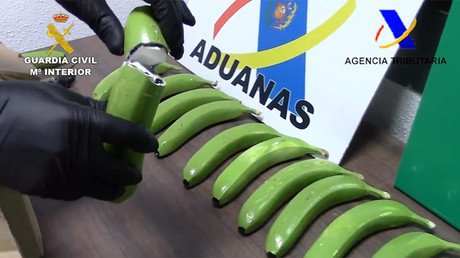‘Crush up your cocaine so it doesn’t hurt your nose’: Spanish drug leaflet sparks fiery debate

Authorities in the northern Spanish city of Zaragoza have come under fire for a controversial booklet which advises readers how to best rack up lines of cocaine.
The 31-page pamphlet, titled “Drugs: the world, the neighborhood,” is filled with tips on how to use both legal intoxicants, like alcohol and tobacco, as well as more unsavory mind-altering substances like speed, cannabis and cocaine, in a way that avoids unwanted consequences.
“In order to make a sniffing tube that does not damage the nostrils it is best to use rolled-up paper or cardboard rather than piping or other hard material,” the guide advises for cocaine. “Crushing the cocaine finely reduces the risk of bleeding or ulcerations on the inside of the nostrils.”
El Ayuntamiento de Zaragoza, en un folleto sobre el consumo de droga: "Pulverice bien su raya de cocaína" https://t.co/9W0dD1iNVTpic.twitter.com/xFm2uQc44r
— 20minutos.es (@20m) February 6, 2018
The guide also advises about choosing different strains of marijuana, and to make speed lines smaller than those of cocaine because amphetamines are generally more potent. The pamphlet was released by Zaragoza’s city hall, led by a coalition of left-wing parties including the populist party Podemos, and handed out among a network of neighborhood associations and youth houses.
But opposition groups including the conservative Popular Party (PP) are outraged at what they see as Zaragoza’s leftist leadership endorsing drug use. On Thursday, the PP filed an emergency motion calling for an immediate withdrawal of the pamphlet and for mayor Pedro Santisteve to be reprimanded for supporting it.
Pleno junta municipal Casco Historico donde @ppaytozaragoza ha presentado moción urgencia pidiendo la retirada inmediata del folleto de drogas y se reprueban las declaraciones del Alcalde Santisteve y Teresa Artigas pic.twitter.com/oT9Eb5JCkk
— Reyes Campillo (@campilloreyes) February 8, 2018
“Rather than emphasize the dangers of drug taking this booklet highlights how to enjoy drugs,” said PP spokesman Jorge Azcon. “What they are telling people is that when consuming drugs, this is how not to hurt their nose, how to take the correct amount, but what they are not told is how cocaine can destroy their life.”
Azcon also criticized the booklet for equating illegal drugs with legal substances or medicines, and for suggesting drug use might be fun.
Opposition to the city’s pamphlet has come from both sides of the political spectrum. The center-left party Ciudadanos announced on Tuesday that its legal department was looking into possible action against the Zaragoza authorities, which spokeswoman Sara Fernandez said was an attempt to "normalize” drug use, undermining years of zero-tolerance policy.
The booklet argues that societies throughout history have always used mind-altering, potentially dangerous substances, from caffeine to alcohol and marijuana. According to the paper, people are likely to take drugs regardless of the law, just as they drank alcohol during Prohibition, so it makes sense to lower the risks involved.
For example, a lot of deaths caused by illegal drugs stem from additives thrown in by unscrupulous dealers rather than the substances themselves. The Zaragoza pamphlet is backed by Consumo ConCiencia, a local harm reduction group which offers to test user’s drugs for purity.
Drug policy reformers have argued that anti-drug campaigns aimed at scaring young people away by stressing their life-destroying properties, such as Nancy Reagan’s Just Say No, are overly simplistic and moralistic without addressing the complex issues surrounding the problem.
Consumo ConCienca’s founder Javier Sanchez countered that the booklet “in no way promotes drug use” but rather provides objective information to “reduce the risks involved in drug taking.” Spain is one of the key entry points for cocaine into Europe, as well as hashish from Morocco, and has one of the highest rates of drug use on the continent.
Think your friends would be interested? Share this story!
















